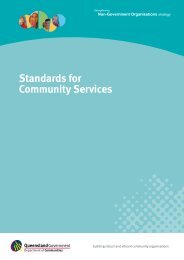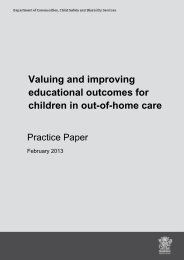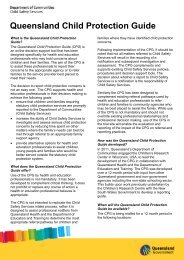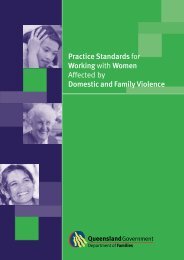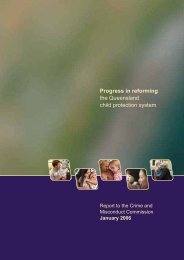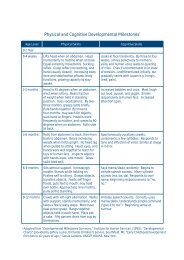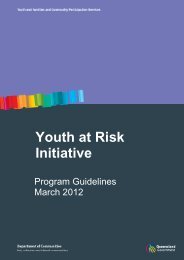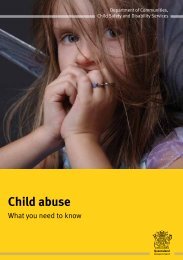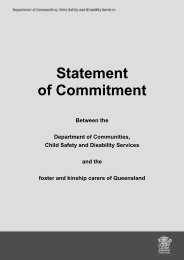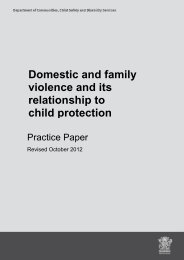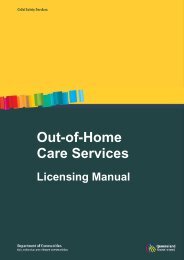Review of the Domestic and Family Violence Protection Act 1989 ...
Review of the Domestic and Family Violence Protection Act 1989 ...
Review of the Domestic and Family Violence Protection Act 1989 ...
Create successful ePaper yourself
Turn your PDF publications into a flip-book with our unique Google optimized e-Paper software.
In 19 <strong>of</strong> <strong>the</strong> statewide forums <strong>the</strong>re was support for legislative<br />
amendments to make <strong>the</strong> ouster condition more effective. Concern<br />
was raised, however, that ousters may not be as effective in some<br />
remote <strong>and</strong> regional areas, for example, mining areas where<br />
accommodation is provided by <strong>the</strong> employer <strong>and</strong> where alternative<br />
accommodation is likely to be scarce or expensive.<br />
Behaviour change programs<br />
There has been an increasing trend nationally to focus on placing<br />
accountability <strong>and</strong> responsibility on perpetrators <strong>of</strong> domestic <strong>and</strong><br />
family violence <strong>and</strong> one <strong>of</strong> <strong>the</strong> strategies to address this has been<br />
to incorporate behaviour change programs into domestic violence<br />
proceedings whe<strong>the</strong>r at <strong>the</strong> civil or criminal stage.<br />
There was support for <strong>the</strong> use <strong>of</strong> behaviour change (or perpetrator)<br />
programs. A total <strong>of</strong> 101 respondents believed behaviour change<br />
programs should be m<strong>and</strong>atory <strong>and</strong> 14 considered <strong>the</strong>y should<br />
be voluntary. At <strong>the</strong> statewide consultation sessions support was<br />
expressed in 19 locations for increased referral to behaviour change<br />
programs as a condition on protection orders <strong>and</strong> at breach stages.<br />
However, stakeholders recognised <strong>the</strong> difficulties in providing services<br />
in remote <strong>and</strong> regional areas in terms <strong>of</strong> availability, accessibility <strong>and</strong><br />
securing appropriately qualified staff to facilitate programs.<br />
One pr<strong>of</strong>essional organisation considered that behaviour change<br />
programs needed to give consideration to certain critical issues:<br />
• established <strong>and</strong> operate on principles <strong>of</strong> safety to women <strong>and</strong><br />
children<br />
• established as part <strong>of</strong> an overall collaborative response to<br />
domestic <strong>and</strong> family violence<br />
• incorporate on-going risk management<br />
• incorporate follow up with female partners<br />
• adhere to best practice st<strong>and</strong>ards<br />
• have heightened <strong>and</strong> swift responses for non-compliance <strong>and</strong><br />
re-<strong>of</strong>fending<br />
• allow for <strong>the</strong> development <strong>of</strong> culturally specific programs for<br />
Aboriginal <strong>and</strong> Torres Strait Isl<strong>and</strong>er people <strong>and</strong> those from<br />
culturally <strong>and</strong> linguistically diverse backgrounds.<br />
M<strong>and</strong>ating programs was considered by four respondents to only be<br />
an option under <strong>the</strong> following circumstances:<br />
• a credible program addressing all behaviours defined as domestic<br />
violence exists<br />
• suitable programs are widely available<br />
• programs have been evaluated <strong>and</strong> demonstrate best practice.<br />
24



